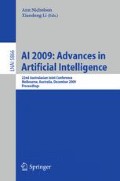Abstract
Advances in mobile computing and user modelling have enabled technologies that help museum visitors select personally interesting exhibits to view. This is done by generating personalised exhibit recommendations on the basis of non-intrusive observations of visitors’ behaviour in the physical museum space. We describe a simple methodology for manually annotating museum exhibits with bags of keywords (viewed as item features), and present two personalised keyword-based models for predicting a visitor’s viewing times of unseen exhibits from his/her viewing times at visited exhibits (viewing time is indicative of interest). Our models were evaluated with a real-world dataset of visitor pathways collected by tracking visitors in a museum. Both models achieve a higher predictive accuracy than a non-personalised baseline, and perform at least as well as a nearest-neighbour collaborative filter.
Access this chapter
Tax calculation will be finalised at checkout
Purchases are for personal use only
Preview
Unable to display preview. Download preview PDF.
References
Herlocker, J.L., Konstan, J.A., Borchers, A., Riedl, J.T.: An algorithmic framework for performing collaborative filtering. In: Proc. of the 22nd Annual Intl. ACM SIGIR Conf. on Research and Development in Information Retrieval (SIGIR 1999), pp. 230–237 (1999)
Bohnert, F., Zukerman, I.: Non-intrusive personalisation of the museum experience. In: Houben, G.-J., et al. (eds.) UMAP 2009. LNCS, vol. 5535, pp. 197–209. Springer, Heidelberg (2009)
Cheverst, K., Mitchell, K., Davies, N.: The role of adaptive hypermedia in a context-aware tourist GUIDE. Communications of the ACM 45(5), 47–51 (2002)
Aroyo, L., Stash, N., Wang, Y., Gorgels, P., Rutledge, L.: CHIP demonstrator: Semantics-driven recommendations and museum tour generation. In: Aberer, K., Choi, K.-S., Noy, N., Allemang, D., Lee, K.-I., Nixon, L.J.B., Golbeck, J., Mika, P., Maynard, D., Mizoguchi, R., Schreiber, G., Cudré-Mauroux, P. (eds.) ASWC 2007 and ISWC 2007. LNCS, vol. 4825, pp. 879–886. Springer, Heidelberg (2007)
Petrelli, D., Not, E.: User-centred design of flexible hypermedia for a mobile guide: Reflections on the HyperAudio experience. User Modeling and User-Adapted Interaction 15(3-4), 303–338 (2005)
Hatala, M., Wakkary, R.: Ontology-based user modeling in an augmented audio reality system for museums. User Modeling and User-Adapted Interaction 15(3-4), 339–380 (2005)
Stock, O., Zancanaro, M., Busetta, P., Callaway, C., Krüger, A., Kruppa, M., Kuflik, T., Not, E., Rocchi, C.: Adaptive, intelligent presentation of information for the museum visitor in PEACH. User Modeling and User-Adapted Interaction 18(3), 257–304 (2007)
Fellbaum, C.: Wordnet: An Electronic Lexical Database. Bradford Books (1998)
Parsons, J., Ralph, P., Gallager, K.: Using viewing time to infer user preference in recommender systems. In: Proc. of the AAAI Workshop on Semantic Web Personalization (SWP 2004), pp. 52–64 (2004)
Schwarz, G.: Estimating the dimension of a model. The Annals of Statistics 6(2), 461–464 (1978)
Pazzani, M., Billsus, D.: Content-Based Recommendation Systems. In: Brusilovsky, P., Kobsa, A., Nejdl, W. (eds.) Adaptive Web 2007. LNCS, vol. 4321, pp. 325–341. Springer, Heidelberg (2007)
James, W., Stein, C.: Estimation with quadratic loss. In: Proc. of the Fourth Berkeley Symp. on Mathematical Statistics and Probability, vol. 1, pp. 361–379 (1961)
Kivinen, J., Warmuth, M.: Exponentiated gradient versus gradient descent for linear predictors. Information and Computation 132(1), 1–63 (1997)
Burke, R.: Hybrid recommender systems: Survey and experiments. User Modeling and User-Adapted Interaction 12(4), 331–370 (2002)
Bohnert, F., Zukerman, I., Berkovsky, S., Baldwin, T., Sonenberg, L.: Using interest and transition models to predict visitor locations in museums. AI Communications 21(2-3), 195–202 (2008)
Author information
Authors and Affiliations
Editor information
Editors and Affiliations
Rights and permissions
Copyright information
© 2009 Springer-Verlag Berlin Heidelberg
About this paper
Cite this paper
Bohnert, F., Zukerman, I. (2009). Using Keyword-Based Approaches to Adaptively Predict Interest in Museum Exhibits. In: Nicholson, A., Li, X. (eds) AI 2009: Advances in Artificial Intelligence. AI 2009. Lecture Notes in Computer Science(), vol 5866. Springer, Berlin, Heidelberg. https://doi.org/10.1007/978-3-642-10439-8_66
Download citation
DOI: https://doi.org/10.1007/978-3-642-10439-8_66
Publisher Name: Springer, Berlin, Heidelberg
Print ISBN: 978-3-642-10438-1
Online ISBN: 978-3-642-10439-8
eBook Packages: Computer ScienceComputer Science (R0)

